Japanese officials visited Toyota’s headquarters following a safety test scandal involving a number of automakers in the country. The Ministry of Transport announced that inspections at Toyota’s offices would continue for several days as concerns over the certification of some of its vehicles grew. Five automakers, including Toyota, Mazda, Honda, Suzuki, and Yamaha, were found to have submitted incorrect or manipulated safety test data, resulting in orders to suspend shipments of certain vehicle models and review safety certification processes. Toyota revealed that at least seven of its models were tested using methods that differed from government standards, leading to investigations into inadequate data in pedestrian and occupant protection tests and errors in crash tests.
Koji Endo of SBI Securities highlighted the stringent nature of Japan’s certification tests, comparing them to other countries and noting that the rule was created in 1951. Despite the outdated nature of these standards, Toyota has conducted a vast number of tests over the years, with only a few concerns raised about specific tests. However, as the world’s top carmaker, the scandal had significant implications for the company’s reputation. Toyota Chairman Akio Toyoda issued an apology during a press conference and pledged to improve the company’s corporate culture to ensure the production of high-quality cars. Operations at Toyota’s factories will continue during the probe, with production being paused for the models under investigation. The Transport Ministry also announced plans to inspect the facilities of the other four carmakers involved in the scandal.
In January, Toyota announced a suspension of shipments for certain models after uncovering irregularities in certification tests for diesel engines developed by its affiliate, Toyota Industries. This revelation followed another scandal involving Daihatsu, a Japanese small carmaker owned by Toyota, which halted domestic production after admitting to forging safety test results for more than 30 years. Despite these issues, Toyota reassured customers that the safety of their vehicles was not compromised and that production would continue at its factories during the investigations. However, the scandal had significant impacts on the company’s reputation and highlighted the need for stronger safety measures and oversight in the automotive industry. The inspections and investigations conducted by Japanese officials aimed to address the safety concerns and ensure compliance with government standards to prevent similar issues in the future.


